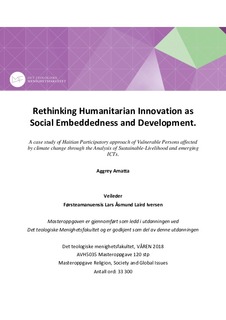Rethinking Humanitarian Innovation as Social Embeddedness and Development : a case study of Haitian Participatory approach of Vulnerable Persons affected by climate change through the Analysis of Sustainable-Livelihood and emerging ICTs
Master thesis
Permanent lenke
http://hdl.handle.net/11250/2565898Utgivelsesdato
2018Metadata
Vis full innførselSamlinger
Sammendrag
This paper establishes how social embeddedness can be strengthened using two innovation ways in developing sustainable-livelihood for disaster vulnerable persons. This involves participation in shelter sites and decentralization in technological humanitarian programmes to ensure informed participation of vulnerable groups. Profoundly, it involves a participatory approach case study of the 2010 Haiti earthquake. I use an inductive approach of qualitative research methods to gather data. Key material entail secondary data using documents, internet, journals, books and scientific dissertations. In using a qualitative research methodology, I implement an inductive approach in constructing the theory of this study. Profoundly, I use grounded theory in analysing the qualitative data of this study. Moreover, contextual analysis and description of participants experience are key.
In conclusion, findings suggest that social embeddedness and moralism are beneficial in investigating sustainable-livelihood of disaster vulnerable persons and digital intervention in non-coercive humanitarian response. Notably, innovation is integral in linking human rights and emerging ICTs through design thinking. Hereby, the implications of these findings are that informed participation and communication capabilities are beneficial in sustainable-livelihood and digital intervention in humanitarian crisis response. I therefore propose that future research should focus on implementing moral principles in technology non-coercive humanitarian programmes.
